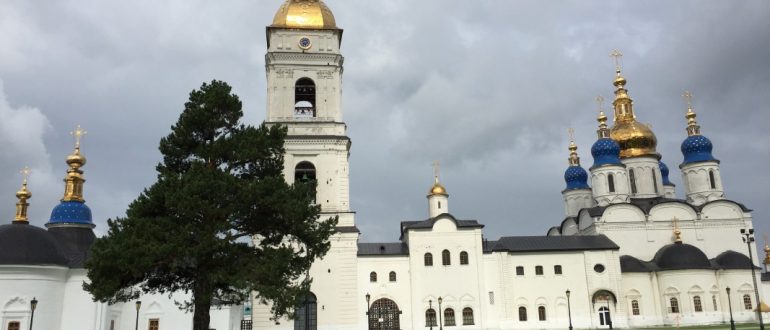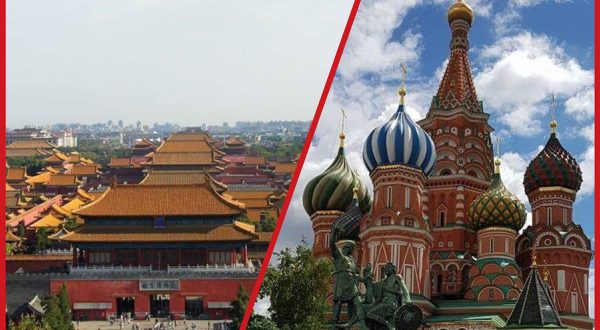
The Traces of Exile in Western-Siberia: Part 1 Tobolsk
July 3, 2017. Heavy rain pours down on us as we leave our minibus in Tobolsk. 140 km north of the Trans-Siberian Railroad and the Russian Federal Highway — the main east-west road across Russia — and populated by approximately 100.000 inhabitants, the sleepy city is little known among travelers.
After having arrived in Tyumen, the capital of the oblast, the night before, Tobolsk is the first real stop of our excursion „Memory as a tool for change: Forgotten places in Siberia”. In total, our journey will take us to ten cities and villages in three different Oblasts of Western Siberia, with more than 3000 kilometers of travelling by bus, train and ship lying ahead of us.
The goal of the excursion is to meet with local experts, activists and contemporary witnesses as well as their relatives in order to find out more about how locals commemorate the various aspects of the Stalinist terror, ranging from deportations and executions to forced labour.
In that respect, Tobolsk, the former capital of Tsarist exile, is the ideal starting point. Withstanding the heavy rain, our guide takes us to the kremlin to introduce us to the history of the city. Founded in 1587, Tobolsk was one of Russia’s first Asian outposts and later became both capital of Siberia and hub for those exiled to the most remote corners of the Russian empire. Until the late 19th century, prisoners exiled to Siberia marched the 2100 km from Moscow to Tobolsk and were then dispersed to other places in Siberia. The prison, located opposite of the city’s marvelous stone kremlin, is arguably one of its kind. Over the years, it received many famous prisoners. Among them were prominent figures of the Decembrists and, most famously, the novelist Fyodor Dostoevsky, who spent a brief stint here in the mid-19th century on his way to a four-year sentence of hard labor in the city of Omsk.
Interestingly, even a church bell got banished to Tobolsk. In the late 16th century, the Volga town of Uglich saw a short-lived uprising against the rule of Tsar Boris Godunov. The Tsar exiled not only the rebels to Siberia, but also found the Uglich church bell they were ringing to start the protest guilty. It was subsequently sent to Tobosk, where it stayed in one of the cathedrals until 1892.
In the lower parts of the city, we pass the home of Dmitri Mendeleev, the Russian eminent chemist. Born in Tobolsk in 1834, he rose to global prominence for designing the periodic table. The city has numerous places that bear witness to its history of exile. We stop at a Polish church built by the once large Polish community consisting of deported Poles who resisted Tsarist rule in Poland in the 18th century. Further into the old town we stop at the house where the last Tsar of Russia, Nikolas II, was held during the civil war from August 1917 to April 1918 before he and his entire family were brought to Yekaterinburg, where they were all killed.
Our second day is spent exploring the Tobolsk prison. Built between 1838 and 1855 and closed in 1989, it housed about 2,500 inmates and was considered to be stricter than other prisons. Today, the premises feature a museum as well as a hostel, where we spent our first night sleeping in former prison cells.
Interestingly, the prison facilities also host the the Association of Deported Volga Germans, which we visit in the afternoon to learn more about the history of deported Germans in the region. The all-female representatives of the Volga Germans all have German ancestry = at least one of their parents or grandparents were deported. Along with many other ethnic groups such as the Tatars, Kalmyks and Chechens, the Volga and Black Sea Germans were forcibly displaced by Stalin, suspected to collaborate with the Nazis. By the end of 1941, at least 900,000 Germans had been deported to Siberia and Central Asia.
The members of the association present us their small German exhibition documenting the history of Germans in the region. Over coffee and tea, we learn more about their small projects through which they try to maintain German culture, such as old German folk-songs, participating in song-contests and upholding German holidays, such as Easter, Christmas or the Day of German Unity.
Interestingly, only one of the representatives still speaks German. The others have either never learned German or forgotten how to speak it overtime.
After meeting the group, on the late afternoon of July 4, full of historical knowledge about the early Tsarist system of exile and impressions of our talks we leave Tobolsk towards Khanty-Mansiysk.
This article was published as part of IFAIR’s ‘Memory as a tool of change – Forgotten Places in Siberia’ Impact Group.



